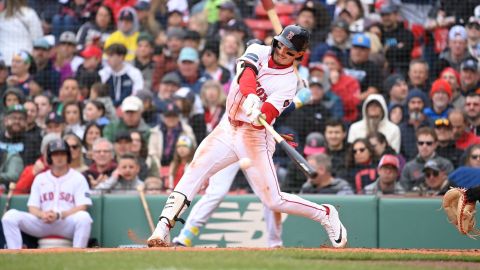 Don’t expect the Boston Red Sox to spend too much time admiring their 2013 World Series rings. Repeating as champions in 2014 will require the same intensity, endurance and attention to detail that made last season’s title possible.
Don’t expect the Boston Red Sox to spend too much time admiring their 2013 World Series rings. Repeating as champions in 2014 will require the same intensity, endurance and attention to detail that made last season’s title possible.
And then some.
Winning a World Series is hard. Winning back-to-back titles is harder. (Rocket science, I know.) That would explain why it’s been 13 seasons since the New York Yankees — Major League Baseball’s last repeat champion — won their third straight title in 2000.
“Because there’s 29 other teams trying to do it, and it’s a very tough game,” Red Sox general manager Ben Cherington said at last week’s Hot Stove Cool Music Baseball Roundtable at Fenway Park when asked why more teams don’t repeat. “It’s a tough league, it’s a tough schedule, it’s a tough season, it’s a long season. There’s always adversity in any season, and the competition is really stiff. Teams can be just as good, I think, the following year and not win the final game in October just because it’s hard to control those outcomes all the time, which is why we’re not spending much time thinking about the outcomes. We’re just working on trying to make sure we put ourselves into a good position and are prepared.”
If the Red Sox don’t win the 2014 Fall Classic, it’ll tie the longest stretch without a repeat champion in baseball history, as MLB also went without a repeat champ from 1979-92. The Toronto Blue Jays ended the previous 14-year stretch by capturing their second straight World Series title in 1993, and the Red Sox already have incorporated Toronto’s repeat performance into their offseason homework.
“We have [looked at past repeat winners]. Unfortunately, there’s not a huge sample of teams that [have repeated]. It’s really the Yankees in the ’90s and Blue Jays before that,” Cherington said. “I guess the common denominator seems to be if you have a really, really good, youngish core that you bring back, then you have a good chance to be good again. But as far as managing it, yeah, we’ve talked about ways that we can manage workloads in spring training and early in the season and things like that to try to help guys that played more through October than maybe they were accustomed to.”
Workload certainly is a huge issue when it comes to repeating as champions. That can be said for any sport, but baseball, which features a 162-game regular-season grind, has immense physical demands, even if it’s not a contact sport, per se. Teams don’t get many off days during the season, and cutting the offseason short by virtue of a deep playoff run absolutely forces organizations to make adjustments.
“I’m sure [manager] John [Farrell] and the staff will have some ideas on how to manage that in spring training, but as I said, I think aside from talent, we’re really just trying to focus on what we felt allowed us to be successful last year,” Cherington said. “I think that’s trying to make disciplined decisions and preparing in the best way that we can and sticking to a process and a set of principles that we believe in, and try to execute everything within that. You can’t always do it perfectly, but that’s what we’re trying to do.”
Everything seemed to go right for the Red Sox in 2013. There were some minor hiccups along the way, but for the most part, Boston’s consistent, drama-free, start-to-finish effort truly was something special. The phrase “team of destiny” typically is a cop-out when discussing what makes a team successful, but if ever there was a squad that fit the label, it’s the 2013 Red Sox.
Can the Red Sox carry last season’s charisma — along with everything else that made them successful — into 2014? It’s an interesting talking point given its intangible nature, yet it’s also a legitimate question when considering the lack of repeat champions in the last decade-plus.
The 2009 Philadelphia Phillies are the only team to reach the World Series the season after winning a title during the current 13-year stretch without a repeat champion. Below is a look at how reigning World Series champions have fared in recent years the season after winning it all.
2013: Boston Red Sox, Next season: ?
2012: San Francisco Giants, Next season: 76-86 (missed playoffs)
2011: St. Louis Cardinals, Next season: 88-74 (lost to San Francisco Giants in NLCS)
2010: San Francisco Giants, Next season: 86-76 (missed playoffs)
2009: New York Yankees, Next season: 95-67 (lost to Texas Rangers in ALCS)
2008: Philadelphia Phillies, Next season: 93-69 (lost to New York Yankees in World Series)
2007: Boston Red Sox, Next season: 95-67 (lost to Tampa Bay Rays in ALCS)
2006: St. Louis Cardinals, Next season: 78-84 (missed playoffs)
2005: Chicago White Sox, Next season: 90-72 (missed playoffs)
2004: Boston Red Sox, Next season: 95-67 (lost to Chicago White Sox in ALDS)
2003: Florida Marlins, Next season: 83-79 (missed playoffs)
2002: Anaheim Angels, Next season: 77-85 (missed playoffs)
2001: Arizona Diamondbacks, Next season: 98-64 (lost to St. Louis Cardinals in NLDS)
2000: New York Yankees, Next season: 95-65 (lost in World Series)
Clearly, it’s been a mixed bag in terms of reigning champs contending the following season. The Red Sox lost Jacoby Ellsbury, Jarrod Saltalamacchia and (perhaps) Stephen Drew in free agency this winter, but they should have enough starting pitching and overall organizational depth to negate those losses and remain competitive in the daunting American League East. The question is whether everything — including difficult-to-project factors, such as good health and good fortune — will go Boston’s way again in 2014.
History shows that repeating isn’t impossible. But it sure isn’t easy, either.
Have a question for Ricky Doyle? Send it to him via Twitter at @TheRickyDoyle or send it here.




